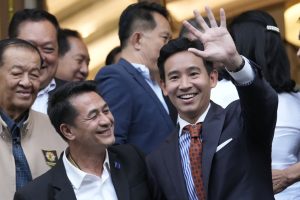The leader of Thailand’s Move Forward Party (MFP) says he is confident of being able to form a stable government, four days after leading the party to a stunning general election victory.
At a press conference at the Okura Prestige Hotel in Bangkok this morning, MFP leader Pita Limjaroenrat announced that two further parties will join his coalition, bringing its total strength to eight parties holding an estimated 313 seats in the 500-seat House of Representatives.
“Today we’re here to announce the forming of a democratic coalition by the people,” the 42-year-old said, flanked by representatives from the other seven parties. He added, “My coalition is taking shape. And we have a very clear roadmap from today and until the day I become PM.”
In Sunday’s election, the MFP exceeded even its own projections in winning a projected total of 152 seats in the House, followed by the opposition Pheu Thai Party, associated with fugitive former Prime Minister Thaksin Shinawatra, which is expected to emerge with 141. In an overwhelming rejection of the military’s role in Thai politics, both parties more than tripled the returns of the military-aligned Palang Pracharath Party (PPRP) and Prime Minister Prayut Chan-o-cha’s United Thai Nation Party.
On Monday, MFP announced that it was planning to form a coalition with five parties – Pheu Thai, the Prachachat Party (9 seats), Thai Sang Thai (6 seats), the Thai Liberal Party (1 seat), and the Fair Party (1 seat). Representatives from the five parties met yesterday for initial talks.
Today’s press conference announced the expansion of the coalition to include two additional parties: Pheu Thai Ruam Palang, which holds two seats, and the Palang Sangkom Mai Party, which holds one.
Pita announced that the eight parties would create an MoU to clarify their policy positions, which will be finalized on May 22 – the ninth anniversary of the 2014 military coup by Prime Minister Prayut Chan-o-cha. Among the points covered in the MoU will be possible reforms to the country’s lese-majeste law, which criminalizes any criticism of the Thai monarchy and is frequently used to silence dissent.
MFP’s pledge to reform the law has been among its most controversial – and popular – policies, breaking the state-enforced taboo against acknowledging the fallibility of the Thai monarchy and the self-evidently political role that it has played in modern Thai history. When asked by Channel News Asia’s Saksith Saiyasombut whether the eight parties have reached a consensus on the reform of the law, Pita said that the coalition partners had “clarity” on how they would proceed.
The coalition’s total of 313 seats is still 63 short of the 376 votes needed to appoint Pita prime minister when Parliament meets for a joint session in July. Much, therefore, hinges on whether he can convince other parties to join his coalition, or at least to vote to appoint him prime minister. The most notable exclusion is the Bhumjaithai Party, a member of Prime Minister Prayut’s ruling coalition, which came in third, with a projected 70 seats. Yesterday, the party announced that it would not support any prime minister who supports amending or abolishing the lese-majeste law.
If it chose to support Pita’s candidacy, it would comfortably push him over the 376-seat threshold, though there are reports of personal animosity between Pita and Bhumjaithai leader, Health Minister Anutin Charnvirakul. Pita said that MFP was currently undertaking “outreach” to other parties.
Failing that, the question then comes down to whether the MFP can convince members of the military-appointed Senate to support Pita’s prime ministership. The Senate was inserted into the military-drafted 2017 Constitution as an implicit bulwark against a non-establishment candidate, which would seem to militate against its supporting a party with as radical an agenda as the MFP. (Pita has said that his policy priorities over the next four years will be to “demilitarize, demonopolize, and decentralize” Thailand.)
But the MFP is hoping that the weight of the opposition victory – and the public’s repudiation of the military establishment – is such that individual senators can be won over. According to Pita, 12 out of the 250 senators say they will support him. He said that the coalition has plans for various scenarios, and that he was concerned neither about the parliamentary vote nor the pending cases seeking to disqualify his candidacy on spurious technicalities. “I’m not worried … I understand there are many dimensions in politics,” he said, according to Reuters. “As a public figure, I can accept the investigation.”
The most interesting question, as Susannah Patton of the Lowy Institute noted in an article earlier this week, is whether the MFP is willing to moderate its policy positions in order to win support.
“Within the broad Move Forward camp, more radical politicians will be urging Pita not to further bargain with the party’s principles,” she wrote. But further negotiations might be necessary to form a government – whether to secure the support of the senate or more lower house MPs.”

































